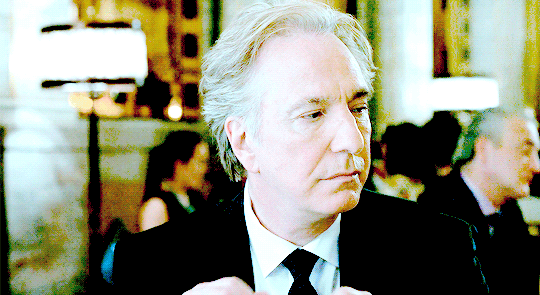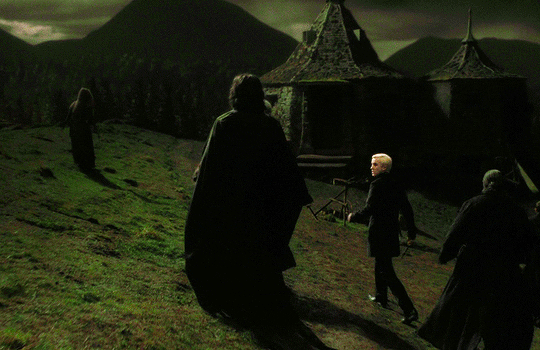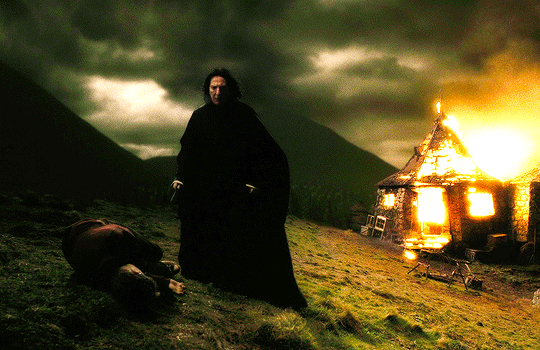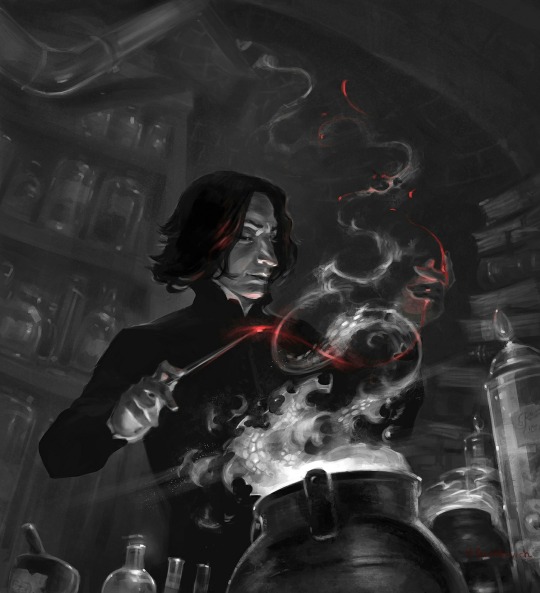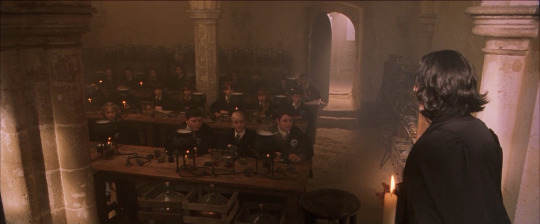~ Pᴏᴛɪᴏɴs Mᴀsᴛᴇʀ ✦ Pʀᴏғᴇssᴏʀ ᴏғ D.A ᴛʜᴇ Dᴀʀᴋ Aʀᴛs ✦ Hᴇᴀᴅ ᴏғ Sʟʏᴛʜᴇʀɪɴ Hᴏᴜsᴇ ✦ Hᴇᴀᴅᴍᴀsᴛᴇʀ ᴏғ Hᴏɢᴡᴀʀᴛs ✦ Oʀᴅᴇʀ ᴏғ ᴛʜᴇ Pʜᴏᴇɴɪx ✦ Dᴇᴀᴛʜ Eᴀᴛᴇʀ ✦ Dᴏᴜʙʟᴇ Aɢᴇɴᴛ ✦ Aʟᴀɴ Rɪᴄᴋᴍᴀɴ Δʟᴡᴀʏs ~ Twitter: @ObscurePrince - Instagram: adorindil_official
Don't wanna be here? Send us removal request.
Text

Alan Rickman on the set of “Mesmer”. 💞
A GIF from a clip from “The Late Show: Truly, Madly, Alan Rickman” from BBC Archive. 😄
Link to that video: https://facebook.com/BBCArchive/videos/153045828401789/
87 notes
·
View notes
Photo










Alan Rickman during a performance of Hamlet at the RiverSide Studios in Hammersmith, West London. September 1992.
210 notes
·
View notes
Photo

Alan Rickman as Severus Snape in Harry Potter and the Deathly Hallows - Part I (2010).
268 notes
·
View notes
Photo

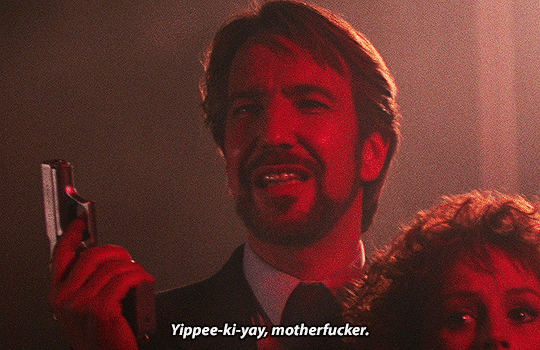
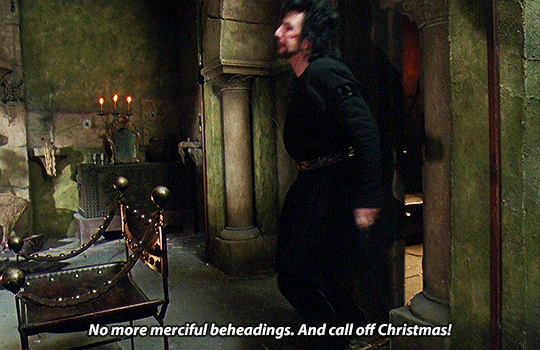

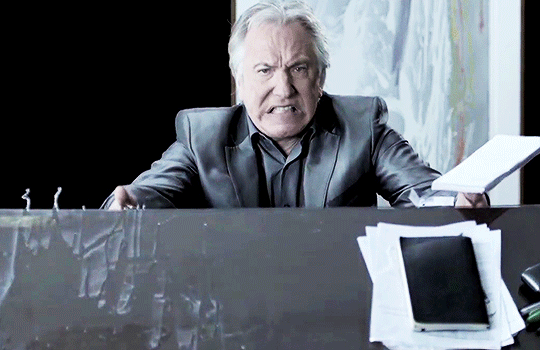
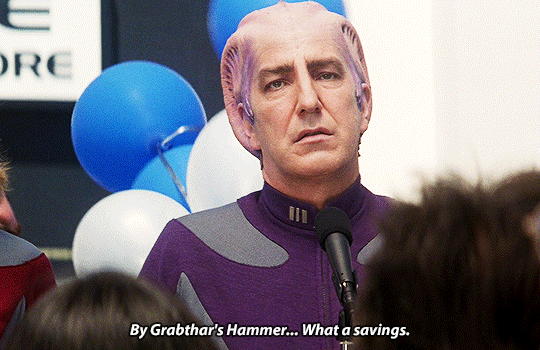
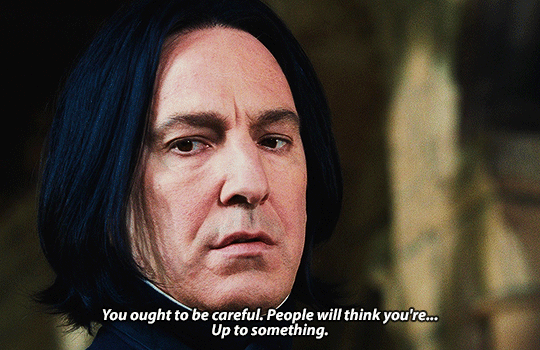
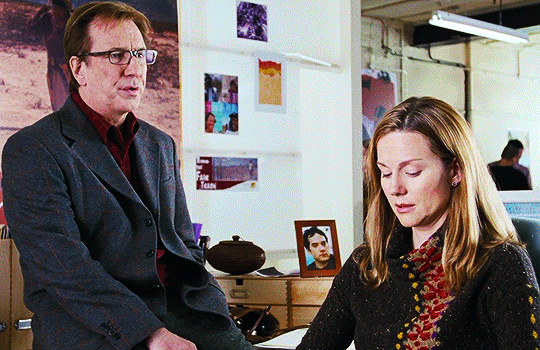
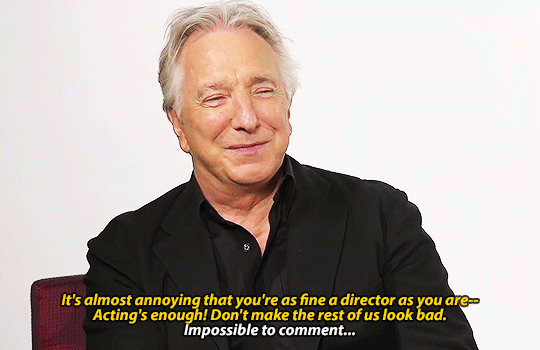
Certainly as actors, and maybe as directors, you’ve got to hang on to something childlike. You’ve got to know what play is. Alan Rickman for @comicbookvillain via @filmgiftexchange 🎄
5K notes
·
View notes
Photo

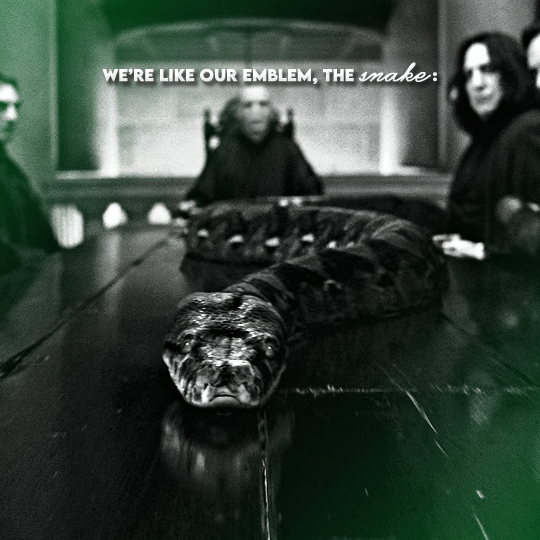
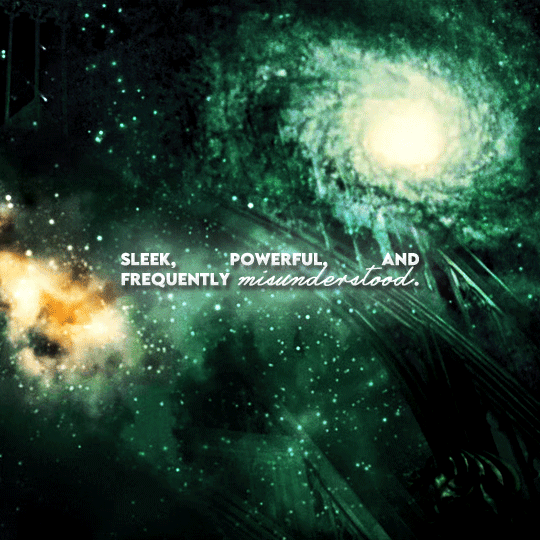
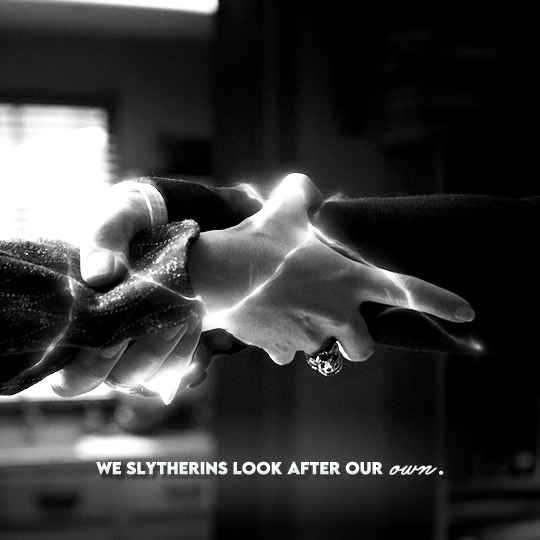
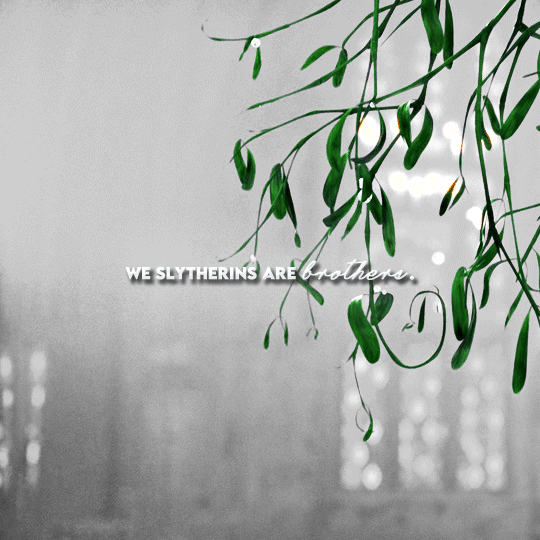


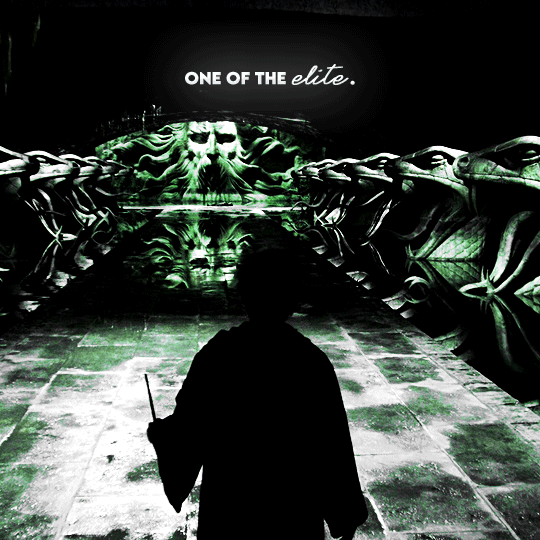
HARRY POTTER MEME ϟ [1/1] HOUSES You could be great, you know, it’s all here in your head, and Slytherin will help you on the way to greatness, no doubt about that. Slytherin House at Hogwarts School of Witchcraft and Wizardry
3K notes
·
View notes
Text

Ad shoot originals for the Prisoner of Azkaban from my aunt who worked on the design team. Rickman gives me the feels [...]
629 notes
·
View notes
Note
I was fairly certain Remus did regret his actions though. He literally tells Harry that he often stood aside and watched it happen without saying anything, and that he wishes he had. In the Prisoner of Azkaban, whenever Snape gives a dig at Lupin or insult him and Harry tries to stand up for Lupin, he repeatedly excuses Snape's actions. Hell, even when Snape tries to reveal Lupin is a werewolf and eventually causes his loss of job, Lupin never hits back, or even tries to defend himself.
I’ll divide my answer into three parts.
1 - Repentance vs Regret
So, you are right. I do think Lupin regrets some of his past actions - but the thing is, it seems to make you think he understood the seriousness of his actions/has grown up/is now a better person. And I strongly believe it is not the case regarding the subject of bullying.
“In repentance, there is a retrospection of the past mistake and a search for a better way so as to not commit the mistake if such a situation arises in the future. In repentance, there is a commitment towards change. Thus, repentance is an act that intends to make one a better person. If you are repenting, it means you are learning from your mistakes and willing to change to become a better person.”
This, does not apply to Remus. We know from the books he never understands and/or refuses to acknowledge what he and his friends did wasn’t justified or deserved; he doesn’t address it as bullying as I explain in this post. Lupin’s behaviour pattern is quite clear throughout the saga: he never or only partially acknowledges his faults and they are always someone else’s doing for the most part.
“Regret is a feeling of remorse that is a negative emotion as it leads one to think continuously about his past action or behaviour and causes more shame, guilt, anger, disappointment etc.
On the other hand, repentance is a positive emotion as it makes one learn about his mistake, and he vows not to repeat it in the future.”
Lupin gives the image of a kind, understanding and mature person who knows how to put into question is own behaviour when necessary when he tells Harry and Sirius he knows he should have prevented them from tormenting Snape (Chapter 29 of OOTP). But then, as the conversation continues, if you closely analyses his thoughts - he keeps indulging into self-beating and talking about his own behaviour. He is completely self-centred and cares more about the image he gives than about the consequences of his actions and this clearly is the way he functions:
- He is willing to risk Harry’s life by not telling Dumbledore Sirius is an animagus rather than confess he betrayed his trust as a teenager: he cares more about what the headmaster thinks of him than about the consequences of his actions.
- He finds the time to acknowledge he should have behaved better - what a mature reaction - but never acknowledges Snape’s trauma or the seriousness of what was done to him. He thinks of it as a “rivalry”.
- He puts a lot of effort into burnishing his and his friends’ image by justifying bullying with “rivalry”, “jealousy”, and agreeing with the fact “it was a mutual hate and those are things that happen” rather than admitting they behaved terribly.
So yes, Remus regrets his actions. But it is clear to me he firstly regrets them because it gives him a bad image in front of Harry and Dumbledore, and to his himself; he never learns from his mistakes nor can make sure to not repeat them in the future, because he simply refuses to acknowledge them and put his energy into minimising them or making them, for the most part, Snape’s own fault. I find Remus to be a self-centred and cowardly person, and this behaviour goes along with it.
However, I am not saying this makes him a bad man and understand this is directly linked to the fact he is a werewolf and giving a positive image of himself is nearly vital for him. But clearly, the fact he regrets his actions means nothing besides what I just explained, in my opinion, because Remus refuses to acknowledge what they did. He never repents and we must not mistake regrets for repentance. Remember that being critical of a character doesn’t make him less interesting or likable and has nothing to do with your personal liking of him. Snape isn’t a saint either, it’s actually interesting to have characters with layers. However, Remus was written kindly and “loved” by the books’ narrative and POV; Snape was not.
2 - He still behaves, in his thirties, like a bully
...which shows he does not repent or feel sorry for what was done to Snape and their other victims. I had the chance to discuss this with @ottogatto and she was very helpful and gave me a very interesting insight on Remus’ behaviour as we see it through Harry’s eyes in the books.
As she explained, nearly every time the subject of Snape is brought up, Remus will subtlely put the fault on him. “He was jealous”, “Your father was more popular than he was and he hated it”, “He was jealous of James’ talent for Quidditch”, “Sirius and James were good at everything and everyone loved them, unlike Snape” are embedded quotes from HP5. Why was Snape furious against him at the end of HP3? “Because he wanted the Order of Merlin”; not because Remus had nearly killed him again as well as three students, just as he had done when Snape was younger. He keeps dismissing the consequences of his actions and justifies (to both Harry and the readers), the abuse Snape went through at the hands of the Marauders. He uses a florilegium of excuses commonly used by bullies that are both very vicious and even pervert in their aims (pervert = lead someone away from what is considered acceptable. Distort or corrupt the original meaning or state of things. Exactly what he does repeatedly). This is still the behaviour of an abuser. If @ottogatto finds the post she made about it, you may like to read it as well. Remus refuses to acknowledge Snape is right to act in the way he does regarding the bullying he went through and thus deepens the hate that already exists between Harry and Snape.
From the (wonderful) @ottogatto: You see, when you tell people how your target is jealous of you, it demonizes them in a shameful way. It tells how they are a pathetic person attacking you wrongfully, oh poor innocent human that did nothing wrong. Jealousy, after all, is a fault that remains completely on the jealous one. It gives your listeners the image that your prey is a mistrustful person while putting you in the position of someone who can be envied -- supposedly for your goodness. Because that prey is framed as mistrustful and ill-intentioned, it allows people to doubt whatever accusation your target might have: either "they're lying", or "exaggerating", or "making things up". Only those who are versed in the mechanisms of bullying -- the easy or the hard way -- will spot the problem. Otherwise, people will find a pretext, a rightful excuse, or an innocent, well-intentioned goal, to keep your prey alone, weak, and "punished".
3 - It is absolutely normal Lupin doesn’t defend himself or hits back when Snape reveals he is a werewolf
...because he is in the wrong. Snape doesn’t even cause his loss of job and you may want to reread the books while not taking Harry’s perspective for the unbiased truth. Dumbledore is obviously the one who asks Remus to resign. Remus just nearly killed three students and a professor, and roamed freely onto both Hogwarts grounds and Hogsmeade as a werewolf, risking many deaths and infections because he forgot the potion Snape had been brewing for him (he depended on Snape, another reason not to fight with him). Dumbledore just learns it isn’t the first time he betrayed his trust and he did the same for two years as a teenager, risking Hogwarts’s closure and reputation and his position as headmaster, breaking the promise he made to him when he was accepted as school. The worst thing is, it is Sirius who tells Dumbledore. Not Remus. Remus clearly demonstrates he is dangerous in spite of himself - Dumbledore learns as well he hid a very important information from him (Sirius being an animagus) during the year, supposedly risking Harry’s life. Dumbledore doesn’t apologize for Snape’s behaviour when he tells him goodbye and it is reasonable to suppose it is because he is fine with Lupin’s identity not being a secret anymore.
I understand Snape’s decision (and certainly Dumbledore’s as well, as read in Snape: A Definitive Reading and various clever posts on Tumblr) may seem cruel and negatively impacted Remus in a society full of prejudices; but I understand Snape’s decision as well. Lupin was a walking danger and had proved it countless of times, nearly killing him: I’ll always argue his decision wasn’t a bad one but you may disagree. I’m sorry for Lupin and what happened to him- but I also am lucid and acknowledge the fact he continuously risked people’s lives and was a danger to society at this point (because said society didn’t help him in any way, don’t get me wrong). But to come back to your main point, Lupin was the only one who caused his loss of job, and he had no legitimacy to call out Snape for revealing his true nature to the public, because clearly only this knowledge would prevent him from doing harm in the future. It’s a complicated situation that goes deeper than Remus and Snape’s relationship.
Lupin could also be deemed as dangerous on another level: he spreads around pro bullying rethorics and makes it look okay if it was "deserved". He makes bullying less serious if the victim isn't likable. He makes bullying less serious because he is likable. And this is very wrong both in and outside the books.
418 notes
·
View notes
Photo



→ Severus Snape for @severusnpe
“After all this time?” “Always.”
725 notes
·
View notes
Photo








Fight back, you coward! Fight back! Harry Potter and the Half-Blood Prince (2009) dir. by David Yates
4K notes
·
View notes
Photo








rewatching harry potter: 3/? (title sequences)
1K notes
·
View notes

